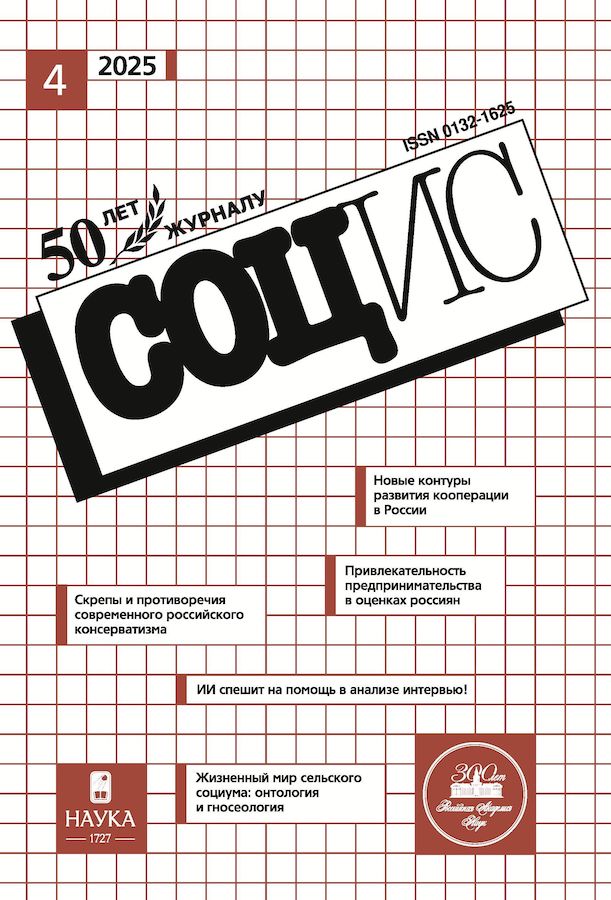Open AI as assistants in interview analysis
- Authors: Galkin K.A.1, Petukhova I.S.1,2, Parfenova O.A.1
-
Affiliations:
- Sociological Institute of FCTAS RAS
- Petrozavodsk State University
- Issue: No 4 (2025)
- Pages: 105-116
- Section: CHAIR. CONSULTATIONS
- URL: https://innoscience.ru/0132-1625/article/view/684487
- DOI: https://doi.org/10.31857/S0132162525040095
- ID: 684487
Cite item
Abstract
The article discusses possibilities of using software (using QDA Miner Light as an example) and artificial intelligence (AI) to analyze in-depth interviews in sociological research. The authors consider a long-known, but not very widespread in the Russian-speaking segment, QDA Miner, as well as the new and increasingly popular Open AI, as tools that can complement traditional approaches to analyzing qualitative data. Various interview arrays are used to test the tools. The article shows how the use of these technologies improves efficiency of information processing, minimizes errors associated with manual coding, tests research hypotheses and obtains new conclusions. All this together allows not only to significantly speed up the analysis process, but also to improve quality of the conclusions obtained. The authors argue for a balanced approach combining traditional methods with innovative technologies to achieve a deeper understanding of research topics and enhance reliability of findings. By showcasing capabilities of both established software and emerging AI tools, this study contributes to advancing methodological practices in sociology and encourages researchers to adopt a more versatile toolkit for qualitative analysis.
Full Text
About the authors
Konstantin A. Galkin
Sociological Institute of FCTAS RAS
Author for correspondence.
Email: kgalkin1989@mail.ru
Cand. Sci. (Sociol.), Senior Researcher
Russian Federation, St. PetersburgIrina S. Petukhova
Sociological Institute of FCTAS RAS; Petrozavodsk State University
Email: irini-prz@yandex.ru
Cand. Sci. (Sociol.), Senior Researcher, docent
Russian Federation, St. Petersburg; PetrozavodskOksana A. Parfenova
Sociological Institute of FCTAS RAS
Email: oparfenova2023@yandex.ru
Cand. Sci. (Sociol.), Senior Researcher
Russian Federation, St. PetersburgReferences
- Bail C. A. (2024) Can Generative AI improve social science? Proceedings of the National Academy of Sciences. No. 21(121): e2314021121. doi: 10.1073/pnas.2314021121.
- Bhaduri S. et al. Reconciling Methodological Paradigms: Employing Large Language Models as Novice Qualitative Research Assistants in Talent Management Research. URL: https://arxiv.org/pdf/2408.11043 (accessed 24.09.24).
- Bumbuc S. (2016) About subjectivity in qualitative data interpretation. International Conference Knowledge-Based Organization. No. 2(22): 419–424. doi: 10.1515/kbo-2016-0072.
- Danilova A. G., Mitina O. V. (2021) Computerized qualitative text analysis. Vestnik Moskovskogo universiteta [Bulletin of Moscow University]. Series 14. Psychology. No. 1: 220–240. doi: 10.11621/vsp.2021.01.09. (In Russ.)
- Davidson T. (2024) Start generating: Harnessing generative artificial intelligence for sociological research. Socius: 1–17. doi: 10.1177/2378023124125965.
- Grossmann I. et al. (2023) AI and the Transformation of Social Science Research. Science. No. 380(6650): 1108–1109. doi: 10.1126/science.adi1778.
- Kelle U. (1996) Computer-Aided Qualitative Data Analysis: an Overview. In: Text Analysis and Computers / Еd. by C. Zü ll, J. Harkness, J.H.P. Hoffmeyer-Zlotnik. In: Mannheim: Zentrum für Umfragen, Methoden und Analysen: 33–63.
- Kotov D. (2023) Algorithms of artificial intelligence in applied sociological research. Sociodigger [Sociodigger]. Vol. 4. Issue. 7–8(27). URL: https://sociodigger.ru/articles/articles-page/algoritmy-iskusstvennogo-intellekta-v-prikladnykh-sociologicheskikh-issledovanijakh (accessed 09.24.24). (In Russ.)
- Krippendorff K. (2018) Content analysis: An introduction to its methodology. Sage publications. In: Parfenova A. et al. (2024) Automating Qualitative Data Analysis with Large Language Models. Proceedings of the 62nd Annual Meeting of the Association for Computational Linguistics. Vol. 4: 177– 185. doi: 10.18653/v1/2024.acl-srw.17.
- Maltseva E.Yu., Molchanova E. V. (2015) Application of information technologies in conducting sociological research. Kontsept [Concept]. No. 2: 61–65. (In Russ.)
- Parfenova A. et al. (2024) Automating Qualitative Data Analysis with Large Language Models. Proceedings of the 62nd Annual Meeting of the Association for Computational Linguistics. Vol. 4. P. 177–185. doi: 10.18653/v1/2024.acl-srw.17.
- Practices of qualitative data analysis in social sciences (2023) / Ed. E. V. Polukhina. Moscow. (In Russ.)
- Strauss A., Corbin J. (2001) Fundamentals of Qualitative Research: Grounded Theory, Procedures, and Techniques / translated from English by Vasilyeva T. S. Moscow: Editorial URSS. (In Russ.)
- Vidyasova L. A. (2023) Active and delayed aging in the assessments of the elderly (according to a pilot study in St. Petersburg). Zhurnal issledovaniy sotsial’noy politiki [Journal of Social Policy Research]. No. 3(21): 485–502. doi: 10.17323/727-0634-2023-21-3-485-502. (In Russ.)
- Wiltshier F. (2011) Researching with NVivo 8. Forum: Qualitative Social Research. Vol. 12. No. 1. URL: http://www.qualitative-research.net/index.php/fqs/article/view/1628/3146 (accessed 24.09.24).
Supplementary files


















